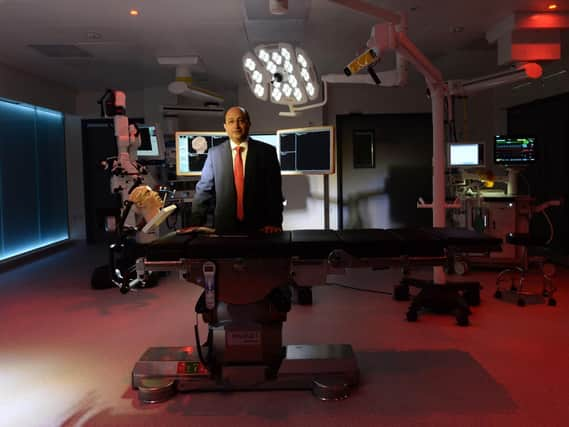New 'sat nav' brain tumour scanner at Sheffield Children's Hospital boosting survival hope


Doctors have hailed the state-of-the-art equipment, which has already helped to remove brain tumours from two young patients, as the key to driving up survival rates from deadly brain cancer
Using an intraoperative MRI scanner together with sophisticated brain mapping equipment, surgeons are able to work out whether they have managed to remove all of a brain tumour while still in theatre.
Advertisement
Hide AdAdvertisement
Hide AdThey can also work out precisely where a tumour is, thereby ensuring surrounding healthy tissue is not damaged.
Surgeons hope to be able to offer the facilities to children up and down the country, with a view to also treating adult patients.
Hesham Zaki, head of the department of paediatric neurosurgery, said the equipment puts the Sheffield hospital at the forefront of increasing survival rates from brain tumours in the UK and worldwide.
He said: "The fact we can use the MRI scanner during the surgery is a real step-change.
Advertisement
Hide AdAdvertisement
Hide Ad"We scan the patient that we are operating on with their skull still open and the operation still ongoing.
"The MRI images mean that we can be sure the tumour has been completely removed and nothing has been left behind before we finish the operation.
"This is important because some types of brain tumour can look like normal brain."
Mr Zaki said children's survival from brain tumours "is almost entirely dependent on whether the surgeon is able to remove all of the tumour".
Advertisement
Hide AdAdvertisement
Hide AdHe said complete removal means there is a 70% to 80% chance of long-term survival.
"But if we leave some behind, this can drop to as low as 40%," he said.
Mr Zaki and colleagues use the MRI scanner in conjunction with "brain lab" technology, which enables them to pinpoint the exact location of a tumour in real time during surgery.
Surgeons use a medical probe or laser coming from the end of a microscope to "touch" tissue and tumour in the brain. The location of different tissue is then shown up on a screen which has been loaded with MRI images from the patient.
Advertisement
Hide AdAdvertisement
Hide AdThis enables surgeons to precisely work out where a tumour is, enabling it to be removed without harming healthy tissue.
Another MRI is then carried out during the operation to ensure all the tumour has gone before the surgery ends.
Mr Zaki said: "Using a combination of MRI scanning and the brain lab ,we can offer the most advanced system in the UK for neuro-navigation.
"Information from the MRI scanner is loaded into the brain lab, which is able to guide us with absolute precision to where we want to go to remove the tumour.
"Just like a sat nav, it tells me where I need to go.
Advertisement
Hide AdAdvertisement
Hide Ad"This is a sea-change. Tumours that were inoperable can now be operated on."
Since the suite opened six weeks ago, two big tumours on two children have been completely removed. The youngest patient was three.
The hospital also has a new MRI suite for follow-up scans, which has removed the need for some children to go under general anaesthetic.